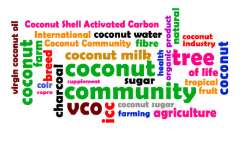Identification of Training Needs of the Coconut Growers in Sri Lanka
Abstract
The coconut farming sector in Sri Lanka has been facing many problems which eventually led to a decrease in production and profitability in coconut farming. The main reason for the decrease in production has been the non adoption of scientific technologies primarily due to the lack of technical knowledge of coconut growers on scientific cultivation practices. Hence, a study was undertaken to assess the technical knowledge and the level of adoption of management practices with a view to identify and prioritize the training needs of coconut growers’. Training needs of the growers were assessed using the Borich Needs Assessment Model. The identified training needs were filtered by quadrant analysis. The discrepancy score of grower’s and the coconut development officers’ of the three districts were used as the dimensions of the quadrant analysis. The training needs were identified under four categories namely, planting practices, fertilizer application practices, agronomy practices and pest management practices. The study revealed that the most knowledgeable aspect was the planting practices and the least knowledgeable was the pest management practices, as evidenced by higher level of adoption of planting practices and the least adoption of pest management practices. It was concluded from the study that the most desirable training need was on the pest management practices followed by fertilizer application practices in the coconut triangle of Sri Lanka.
References
Atreya, K., 2007. Pesticide use knowledge and practices: a gender differences in Nepal. Environ. Res. 104: 305-311
Borich, G.D., 1980. A needs assessment model for conducting follow-up studies. J. Teach. Educ. 31: 39-40.
Hair, J.F., Anderson, R.E.J., Tatham, R.L. and Black, W.C., 1998. Multivariate data analysis, (5th ed.), New Jersey: Prentice-Hall.
Hashemi, S.M., Mokhtarnia, M., Erbaugh, J.M., Asadi, A., 2008. Potential of extension
workshops to change farmers’ knowledge and awareness of IPM. Sci. Total Environ. 407: 84-88.
Hashemi S.M., Hosseini S.M., Damalas C.A., 2009. Farmers’ competence and training needs on pest management practices: participation in extension workshops. Crop Prot 28: 934-939.
Liyanage, M. de S., 1999. Scientific cultivation of coconut, Coconut Research Institute, Lunuwila, Sri Lanka: 2.
Magat, S. S., 1978. A review of fertilizer studies on coconut, Philippine Journal Coconut Studies., 3(2): 51-69.
Meerman, F., Bruinsma, W., Van Huis, A., Ter Weel, P., 1997. Integrated pest management: smallholders fight back. ILEIA Newsl. 13(4): 4
Peiris et al, 2006. Coconut research development and dissemination of technologies – Growers perception. A diagnostic survey report, Coconut Research Institute, Lunuwila, Sri Lanka: 33-77.
Prudent, P., Loko, S., Deybe, D., Vaissayre, M., 2007. Factors limiting the adoption of IPM practices by cotton farmers in Benin: a participatory approach. Exp. Agr. 43: 113-124.
Statistics on coconut and oil palm. 1, 2011. Coconut Research Institute, Lunuwila, Sri Lanka: 18.
Trutmann, P., Voss, J., Fairhead, J., 1996. Local knowledge and farmer perceptions of bean diseases in the Central African Highlands. Agr. Human Values 13: 64-70.
Witkin, B. R., 1984. Assessing needs in educational and social programs. San Francisco, CA: Jossey-Bass Inc.











